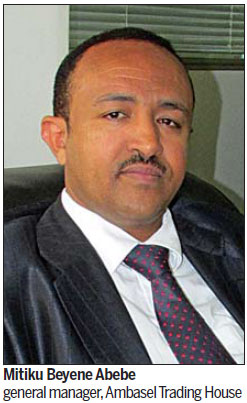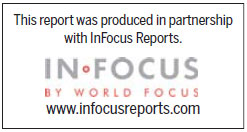Local companies think ahead to potential for added value
Big projects hold the key to Ethiopia's growth for all, according to president
Exciting things are happening with companies working on the ground in Ethiopia. With a country in the midst of development, the construction sector is expanding with public sector investment in large infrastructure projects and rapid urban expansion fueling the boom. Roads, bridges and dams are springing up, thanks to Chinese support. China has either financed, or financed and built, about 70 percent of the paved roads in the country.
One company rising to the challenge is Derba Midroc Cement, which is executing a number of cement production projects in different parts of the country.
The company's 5,000 tons per-day clinkerization production plant under construction in Derba, 70 kilometers from Addis Ababa, will be the largest cement production plant in the country when complete.
Part of the Midroc group of companies, a firm known for its commitment to Ethiopia's development, the Derba Group is an ambitious company for an ambitious country. The new factory should reach a 50 percent market share, contributing to the development of the industry sector and meeting the nation's need for cement, according to Haile Assegide, executive director of Derba.

"We are aiming to be the leading cement supplier in the country and the group has plans to invest $3.4 billion over the next five years that would lead to the creation of 370,000 jobs, plus the implementation of the latest technology into the national industry. Our target is to build a second plant as demand increases. Ethiopia is self-sufficient in cement," he said.
The design and manufacture of the plant's production machinery are based on cutting-edge cement technology, using coal and heavy fuel oil as fuel.
Among the major raw materials required for cement production, limestone, clay, basalt, sandstone and gypsum are available in significant quantities in the Derba-Mugar Valley. A preliminary geological study of raw materials in the area showed that there are more than enough to keep the new plant going for life.
"Pumice, the raw material required for the production of PPC cement is not available in the Derba-Mugar Valley, however, so this will need to be transported by truck from the Nazareth or Zeway areas," Assegide said.
Managing director of the Bahirdar Tannery, Yigzaw Assefa, said betting on Ethiopia's future is a wise move.
"Ethiopia has become a focal point for tanneries because its sheepskin, goatskin and cowhide are renowned for being high-quality," he said. "We buy new machines every year and have increased our capacity from 2,000 to 3,000 tons. It is not the number that matters, but the quality and the value we can add."
Sowing seeds of growth
Employing about 80 percent of the population, Ethiopia's agricultural sector has one of the largest and most diverse genetic resources in the world, yet only 16 percent of its arable land is currently being cultivated.
The sector offers excellent incentives to local and foreign investors and is a promising source of export diversification. Oil seeds and pulses, for example, are known for their flavor and nutritional value, with sesame being Ethiopia's primary export to China. Sesame seed exporter Ambasel Trading House began to export its product 15 years ago and its export volumes have increased each year.
Growth for 2014 was expected to reach about 10 percent.
General manager of Ambasel Trading House, Mitiku Beyene Abebe, said, "Sesame exports are a government priority. It is a matter of economic policy since it brings in foreign currency. The farmers are aware of the situation and are encouraged to produce sesame."

"There is huge demand to export in greater volumes, and we are marketing ourselves by participating in different trade fairs in places such as Dubai and Japan. We are interested in participating in events in China too, as we really want to expand our market there. Our goal is to keep producing high-quality products at fair prices and maintain client trust," he said.
Since opening a new processing plant, Ambasel has embarked on an expansion drive and plans to branch out into red peas, white peas and coffee in the near future.
Guna Trading House, part of the Effort group of companies, has successfully implemented import-export operations in Ethiopia for more than 20 years.
Berhane Tesfay, deputy general manager of Guna Trading said, "We have already opened communications with China and, in the future, we hope to be one of the biggest distribution centers for consumer goods in East Africa."
InFocus provided the story.
(China Daily 07/13/2015 page15)














